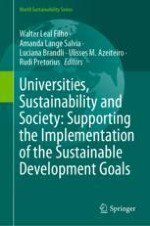2021 | OriginalPaper | Chapter
Understanding Scale in Wicked Problems of Sustainable Development: Who Needs Dedicated Courses in Higher Education?
Author : Sven Linow
Published in: Universities, Sustainability and Society: Supporting the Implementation of the Sustainable Development Goals
Publisher: Springer International Publishing
Activate our intelligent search to find suitable subject content or patents.
Select sections of text to find matching patents with Artificial Intelligence. powered by
Select sections of text to find additional relevant content using AI-assisted search. powered by
